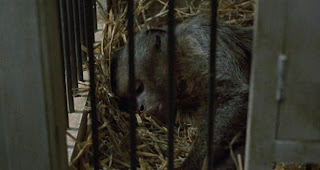‘Paranoiac’ is one of those stylish, squiffy supporting feature thrillers that Hammer quietly excelled at in the sixties although, sports cars and Hush Puppies modernism aside, it could just as easily have formed part of their better known Gothic cycle. It’s about a haunted house, after all, and is as morbid as hell - choc-a-bloc with murder and madness and desiccated corpses and organ playing in the dark. Oh, and darts.
It’s also about the 25 year old Oliver Reed, excellent here as the febrile Simon, a bag of neuroses in a bruiser’s body– an overgrown, over-wrought child who drinks too much, drives too fast and has a dirty, nasty, nutty secret which has driven him around the bend. He’s in good company, though, as more or less everyone in the story is absolutely barking mad – except for the hero, who is a fraud and a criminal. It’s a wonderful advertisement for country living, and a nice summary of upper class values that still rings true today.
The story, which twists and turns before skidding through a hedge and hurtling off a cliff, is competently and cleanly directed in crisp black and white by Freddie Francis, perhaps the most interesting of all Hammer helmsmen. The dénouement is a thick, fat slice of Grand Guignol, and is absolutely delicious. I must have seen this film a dozen times. I never tire of it.









.avi_snapshot_00.00.26_%5B2013.06.02_14.25.01%5D.jpg)
.avi_snapshot_01.04.25_%5B2013.06.30_17.45.52%5D.jpg)
.avi_snapshot_00.19.43_%5B2013.06.30_17.39.27%5D.jpg)
.avi_snapshot_01.04.21_%5B2013.06.30_17.42.58%5D.jpg)
.avi_snapshot_01.18.30_%5B2013.06.30_17.46.20%5D.jpg)
.avi_snapshot_00.59.10_%5B2013.06.30_17.49.10%5D.jpg)
.avi_snapshot_00.00.30_%5B2013.07.14_12.47.46%5D.jpg)







































